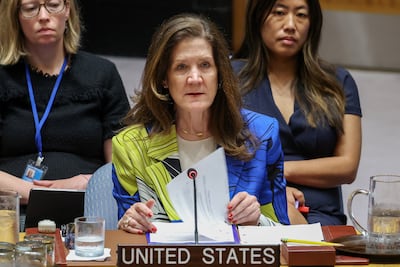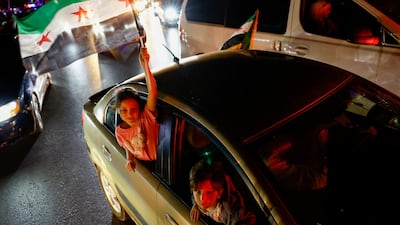A potential dispute is widening among UN Security Council members over sanctions on Syria, with some opposing a US-led drive to lift all restrictions on Damascus.
US President Donald Trump last month ordered an easing of sanctions on Syria but as some American measures require an act of Congress to be wiped out, several Security Council designations remain in place.
The US sees full and immediate sanctions relief as vital to stabilising and rebuilding Syria after a 14-year civil war ended in December with the removal of former president Bashar Al Assad.
His defeat was led by Hayat Tahrir Al Sham (HTS), which once had ties to Al Qaeda and has been on the US sanctions list since 2014 - though its designation as a foreign terrorist organisation was revoked this month. Several HTS members including Syria's President Ahmad Al Shara remain subject to a travel ban, frozen assets and other measures.
The US this week urged the Security Council to review its sanctions on Mr Al Shara and HTS, saying changes were necessary to support Damascus in its fight against terrorism, including ISIS and Al Qaeda-linked groups.
Dorothy Shea, acting US ambassador to the UN, said Washington was working with council members to address the Syria-related sanctions, stressing the government in Damascus had demonstrated a commitment to combat extremist threats.
The 36th UN report of the Analytical Support and Sanctions Monitoring Team said that while no operational ties between HTS and Al Qaeda had been observed, some member nations raised concerns that other members, particularly those in tactical positions or absorbed into the newly formed Syrian army, remained ideologically loyal to Al Qaeda.
The report estimated more than 5,000 foreign “terrorist fighters” remain at large in Syria, posing a threat to regional stability.
“Member states noted the complexity of the issue and expressed concern that efforts to legitimise foreign terrorist fighters may regularise their status in the Syrian Arab Republic without reducing their threat,” the report notes. Some foreign terrorist fighters – in particular those from Central Asia- retained “external ambitions” and were dissatisfied with the interim government’s approach.
Ms Shea called on the Security Council to adjust its sanctions so “the Syrian government can prevail in the fight against terrorism, while keeping the most dangerous and unrepentant actors designated".

Several council members, including Russia, China and France, advocate a more measured approach to lifting sanctions, with Beijing the most vocal.
“China's main issue with delisting HTS remains the question of foreign fighters, specifically the presence of Uighur nationalists in Syria, whom they consider an issue of national security concern,” Maya Ungar, a UN analyst at the International Crisis Group, told The National.
“Russia, France and other European countries remain concerned about foreign fighters as well, as there are European, Chechen and Central Asian fighters active in Syria."
Ms Ungar noted any compromise on foreign fighters that satisfies the Chinese on the issue is also likely to end up satisfying Russia and France as well.
Mr Trump has embraced Mr Al Shara's presidency and during a visit to Saudi Arabia in May he said he would end all sanctions on Syria. But only the US Congress can repeal the Caesar Act, legislation from 2019 that sought to punish the Assad regime.
In Washington, recent violence in Syria is fuelling a debate in Congress about whether it should repeal the Caesar Act in full, or adjust it so restrictions can be lifted only if Damascus meets human rights and other benchmarks.
Republican Representative Mike Lawler this month introduced a bill that would amend the act to allow it to be waived if the Syrian government is not targeting civilians, among other provisions.
The Syrian Emergency Task Force, which works to help build democracy in Syria, urged US legislators to vote against Mr Lawler's bill and push for a clean repeal.
Because the Caesar sanctions were placed against the Assad regime, they should by definition be lifted without conditions, Mouaz Moustafa, the task force's executive director, told The National.
“Lifting those sanctions does not mean the US can't sanction Syria, or individuals or groups or whoever in Syria that commits any crimes against any minority,” he said. The Caesar Act currently has a temporary and renewable waiver but Mr Moustafa said the US has a moral obligation to scrap the legislation once and for all.
He said using Caesar as leverage over Syria's new government threatens to destabilise Syria and risk further civil war.
“Caesar is not the way to hold the Syrian government accountable for any mistakes it may make, or has made,” Mr Moustafa said. “Caesar was about Assad. Assad is gone.”


